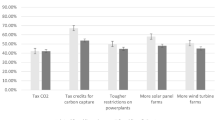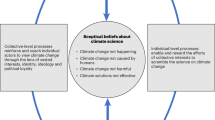Abstract
Although a majority of US citizens think that the president and Congress should address global warming, only a minority think it should be a high priority1. Previous research has shown that four key beliefs about climate change—that it is real, human caused, serious and solvable—are important predictors of support for climate policies2. Other research has shown that organized opponents of climate legislation have sought to undermine public support by instilling the belief that there is widespread disagreement among climate scientists about these points3—a view shown to be widely held by the public1. Here we examine if this misperception is consequential. We show that the misperception is strongly associated with reduced levels of policy support and injunctive beliefs (that is, beliefs that action should be taken to mitigate global warming). The relationship is mediated by the four previously identified key beliefs about climate change, especially people’s certainty that global warming is occurring. In short, people who believe that scientists disagree on global warming tend to feel less certain that global warming is occurring, and show less support for climate policy. This suggests the potential importance of correcting the widely held public misperception about lack of scientific agreement on global warming.
This is a preview of subscription content, access via your institution
Access options
Subscribe to this journal
Receive 12 print issues and online access
$209.00 per year
only $17.42 per issue
Buy this article
- Purchase on Springer Link
- Instant access to full article PDF
Prices may be subject to local taxes which are calculated during checkout

Similar content being viewed by others
References
Leiserowitz, A., Maibach, E., Roser-Renouf, C. & Smith, N. Climate Change in the American Mind: Americans’ Global Warming Beliefs and Attitudes in May 2011 (Yale Univ. and George Mason Univ., Yale Project on Climate Change Communication, 2011).
Krosnick, J. A., Holbrook, A. L., Lowe, L. & Visser, P. S. The origins and consequences of democratic citizens’ policy agendas: A study of popular concern about global warming. Climatic Change 77, 7–43 (2006).
Oreskes, N. & Conway, E. M. Defeating the merchants of doubt. Nature 465, 686–687 (2010).
Anderegg, W. R. L. Moving beyond scientific agreement. Climatic Change 101, 331–337 (2010).
Doran, P. T. & Zimmerman, M. K. Examining the scientific consensus on climate change. EOS Trans. AGU 90, http://dx.doi.org./10.1029/2009EO030002 (2009).
http://www.nationalacademies.org/includes/G8+5energy-climate09.pdf.
Burkemann, O. Memo exposes Bush’s new green strategy. The Guardian (4 March 2003); available via http://go.nature.com/NfYAsm.
Revkin, A. C. Bush aide softened greenhouse gas links to global warming. The New York Times (8 June 2005); available via http://go.nature.com/8lUN4e.
Boykoff, M. T. & Boykoff, J. M. Balance as bias: Global warming and the US prestige press. Glob. Environ. Change 14, 125–136 (2004).
Malka, A., Krosnick, J. A. & Langer, G. The association of knowledge with concern about global warming: Trusted information sources shape public thinking. Risk Anal. 29, 633–647 (2009).
Miller, J. D. Public understanding of, and attitudes toward, scientific research: What we know and what we need to know. Public Understanding Sci. 13, 273–294 (2004).
Leiserowitz, A., Smith, N. & Marlon, J. Americans’ Knowledge of Climate Change (Yale Univ., Yale Project on Climate Change Communication, 2010).
Petty, R. E. & Wegener, D. T. in Dual-Process Theories in Social Psychology (eds Chaiken, S. & Trope, Y.) (Guilford Press, 1999).
McCright, A. M. & Dunlap, R. E. Anti-reflexivity: The American conservative movement’s success in undermining climate science and policy. Theory Cult. Soc. 27, 100–133 (2010).
Leiserowitz, A. Climate change risk perception and policy preferences: The role of affect, imagery, and values. Climatic Change 77, 45–72 (2006).
Kahan, D. M., Jenkins-Smith, H. & Braman, D. Cultural cognition of scientific consensus. J. Risk Res. 14, 147–174 (2011).
Kunda, Z. The case for motivated reasoning. Psycholog. Bull. 108, 480–498 (1990).
Munor, G., Leary, S. & Lasane, T. Between a rock and a hard place: Biased assimilation of scientific information in the face of commitment. North Am. J. Psychol. 6, 431–444 (2004).
Wood, B. D. & Vedlitz, A. Issue definition, information processing, and the politics of global warming. Am. J. Polit. Sci. 51, 552–568 (2007).
IPCC Climate Change 2007: Climate Change Impacts. Summary for Policymakers (World Meteorological Organization, 2007).
Jacques, P. J., Dunlap, R. E. & Freeman, M. The organisation of denial: Conservative think tanks and environmental skepticism. Environ. Polit. 17, 349–385 (2008).
Hoggan, J. & Littlemore, R. Climate Cover-Up: The Crusade to Deny Global Warming (Greystone Books, 2009).
Lakoff, G. Don’t Think of an Elephant (Chelea Green Publishing, 2004).
Schwarz, N., Sanna, L. J., Skurnik, I. & Yoon, C. Metacognitive experiences and the intricacies of setting people straight: Implications for debiasing and public information campaigns. Adv. Exp. Soc. Psychol. 39, 127–161 (2007).
Hornik, R. Public Health Communication: Evidence for Behavior Change (Lawrence Erlbaum Assoc., 2002).
Callegaro, M. & Disogra, C. Computing response metrics for online panels. Public Opin. Quart. 72, 1008–1029 (2008).
Chang, L. & Krosnick, J. A. National surveys via RDD telephone interviewing versus the Internet. Publ. Opin. Quart. 73, 641–678 (2009).
Preacher, K. J. & Hayes, A. F. Asymptotic and resampling strategies for assessing and comparing indirect effects in multiple mediator models. Behav. Res. Methods 40, 879–891 (2008).
MacKinnon, D. P. Introduction to Statistics Mediation Analysis (Lawrence Erlbaum, 2008).
Acknowledgements
The study was funded by the Surdna Foundation, the 11th Hour Project, the Pacific Foundation, the Grantham Foundation, Prism Public Affairs and a Health Policy Investigator Award from the Robert Wood Johnson Foundation. The authors wish to acknowledge T. Myers at George Mason University for her help with statistical analyses.
Author information
Authors and Affiliations
Contributions
E.W.M. and D.D. conceptualized the research question. D.D. conducted data analysis and wrote the first draft of the manuscript. X.Z. provided statistical assistance. E.W.M., C.R-R., X.Z and A.L. wrote and revised parts of the manuscript. A.L., E.W.M. and C.R-R. designed and conducted the national survey.
Corresponding author
Ethics declarations
Competing interests
The authors declare no competing financial interests.
Rights and permissions
About this article
Cite this article
Ding, D., Maibach, E., Zhao, X. et al. Support for climate policy and societal action are linked to perceptions about scientific agreement. Nature Clim Change 1, 462–466 (2011). https://doi.org/10.1038/nclimate1295
Received:
Accepted:
Published:
Issue Date:
DOI: https://doi.org/10.1038/nclimate1295
This article is cited by
-
A representative survey experiment of motivated climate change denial
Nature Climate Change (2024)
-
Polarisation of Climate and Environmental Attitudes in the United States, 1973-2022
npj Climate Action (2024)
-
Influence of climate change beliefs on adolescent food saving behavior: mechanisms mediating environmental concerns
Environment, Development and Sustainability (2024)
-
Participating in a climate prediction market increases concern about global warming
Nature Climate Change (2023)
-
On masks and masking: epistemic harms and science communication
Synthese (2023)



